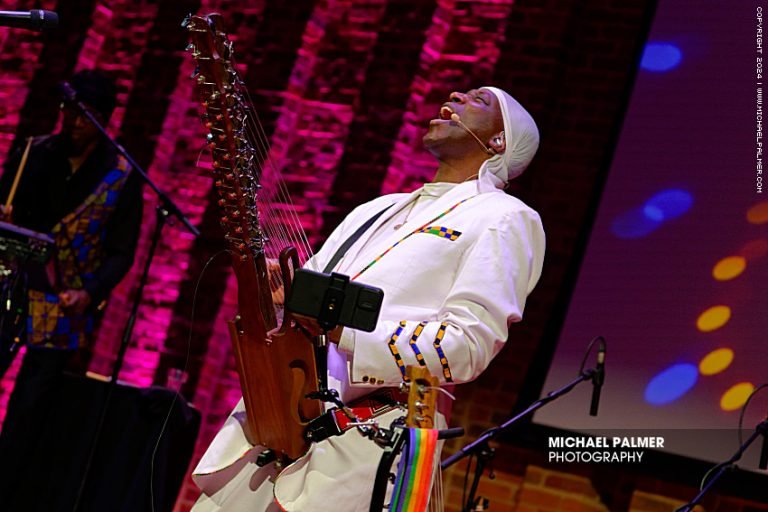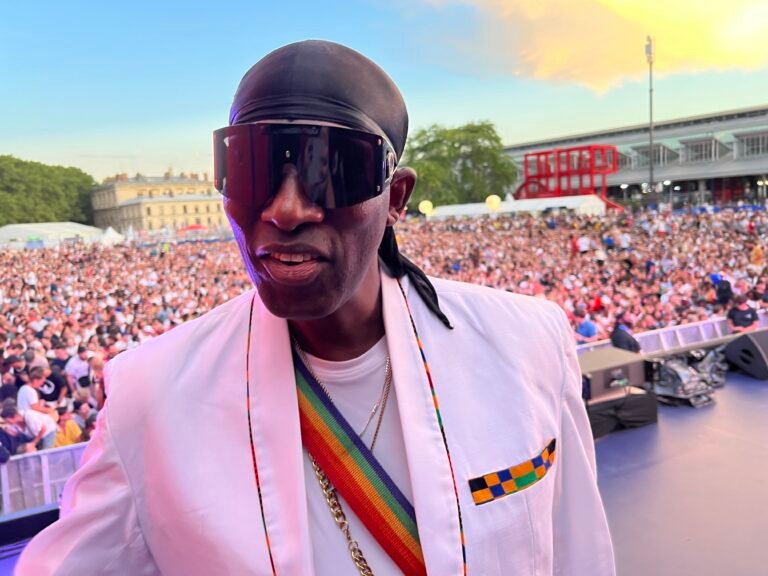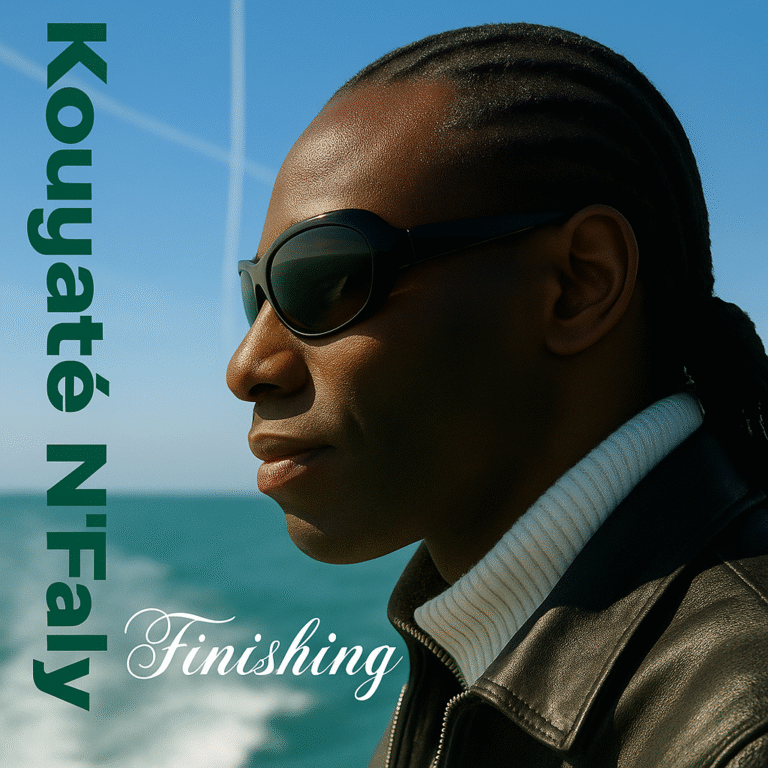Review By Halina Wegner
When N’Faly Kouyaté releases a record, it’s never just an album—it’s a manifesto. Finishing, his forthcoming 13-track work, is a deeply considered piece of art that transcends the typical boundaries of “world music.” It is at once rooted in the ancient griot tradition and fearlessly forward-looking, blending African heritage with modern, genre-blurring production.
The seed for Finishing was planted during nine months of isolation by the Bafing River in Guinea, a time that forced reflection on a single provocative question: What if war, greed, lies, and violence suddenly vanished? Kouyaté’s answer comes not in the form of a sermon, but a multi-lingual, rhythm-driven conversation—sung in Mandingue, Soussou, Pular, French, and English—that dances between celebration and confrontation.
Opening track “Maloya” sets the tone, warning of the hazards of heedless passion while weaving in themes of cultural exchange and adaptation. Its layers of kora, percussion, and contemporary arrangement pull the listener into the album’s hybrid universe: ancestral Africa meeting modern sensibility.
From there, “Free Water,” a collaboration with reggae icon Tiken Jah Fakoly, delivers a soaring plea for one of humanity’s most precious resources. The message is urgent, but the groove is irresistible—this is protest music that makes you move.
“Kawa” strips back the bombast to issue a timeless call for humility, a reminder that dignity outlasts vanity. “Premiers Pas” continues in a more optimistic vein, framing the collaboration between Africa and the wider world as a journey of equal partners learning to walk together.
The heart of Finishing lies in tracks like “Bandambé,” a personal and emotional tribute to Kouyaté’s late brother, and “Woalu,” a biting response to slander and ingratitude. These songs reveal a man equally committed to preserving family honor and confronting corrosive social habits.
“Kolabana,” featuring Senegalese rapper Didier Awadi, swings back into political urgency, lamenting broken promises and apathy in the face of global crises. The following “Mandela” is a stirring homage to the South African leader’s ideals of forgiveness and reconciliation, delivered with a reverence that feels earned rather than performative.
Kouyaté’s storytelling gifts are fully on display in “Departure,” a parable-like narrative that folds compassion and injustice into a fable worthy of the griot lineage. “Mökhöya (Dignity)” and “Halala” continue the moral throughline, reinforcing values of mutual aid, integrity, and solidarity—lessons urgently needed in the modern world.
The title track “Finishing” acts as the philosophical anchor, asking the listener to imagine a world where humanity’s worst impulses have ended. Rather than close on a neat resolution, it leaves space for contemplation, its hopeful undercurrent a challenge as much as a comfort.
The bonus track “Yèkè Yèkè” is the sole cover, but its inclusion is significant: a tribute to the late Mory Kanté, Kouyaté’s fellow griot and global music pioneer. In reimagining this classic, he honors tradition while infusing it with his own contemporary touch—a perfect summation of the album’s ethos.
Musically, Finishing is an expansive, borderless soundscape. Traditional West African instrumentation—kora, balafon, percussion—interlocks with electronic textures, jazz-inflected phrasing, AfroBeat drive, and even flashes of R&B. Kouyaté’s voice, alternately honeyed and commanding, is the constant throughline, as capable of intimate storytelling as rallying-cry urgency.
The production is as intentional as the songwriting. Every track feels meticulously shaped, yet never sterile; the organic warmth of hand-played instruments is preserved, even as modern studio techniques give the music a global polish. It’s an album designed for both deep listening and wide-reaching resonance.
Beyond its musicality, Finishing functions as a cultural bridge. Kouyaté stands in a unique position—descended from one of West Africa’s most respected griot families, trained in the oral tradition since childhood, yet fully fluent in the global music language after decades of collaborations with artists from Peter Gabriel to Robert Plant. His “Afrotronix” sound is not fusion for fusion’s sake, but a genuine meeting of worlds.
This is not an album to consume casually. Its themes—water rights, integrity, reconciliation, heritage, resistance—are woven into its very DNA, challenging the listener to engage beyond the surface. But Finishing rewards that engagement with a rare blend of wisdom and vitality. It’s protest music without cynicism, heritage music without nostalgia, global music without borders.
If Kouyaté set out to create “a call to reflection and action,” he’s succeeded. Finishing is the sound of an artist at the height of his powers, using every tool—language, rhythm, melody, story—to urge us toward a more conscious, compassionate future. It is not only a landmark in his career, but a work that belongs in the broader conversation about music’s role in shaping the world we live in.
Source: Jace Media Music



